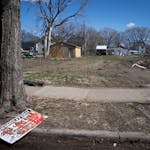Minneapolis police union leaders told state senators Wednesday they felt abandoned by city leaders during the civil unrest in May that followed the death of George Floyd, a Black man killed in police custody.
"This needs to be talked about. These officers need to be defended," Minneapolis Police Sgt. Anna Hedberg said as she described watching the city's Third Precinct police station burn.
Two Republican-led Senate committees on Wednesday held the last in a series of hearings focused on the lawlessness of the protests and the responses of city and state leaders, which have come under sharp criticism from President Donald Trump and state GOP leaders.
Three Minneapolis Police Federation board members told legislators that city and state leadership failed by not sending in other law enforcement agencies earlier to help Minneapolis police.
Officer Rich Walker said "politics got in the way" of the response of city and state officials. He described being demoralized watching the Third Precinct building being abandoned, overrun by protesters and set ablaze on May 28, three nights after Floyd's death.
Walker, who is Black, said union members told him around noon that day that the department was giving up the Third Precinct. He went to pick up equipment and described the scene of police employees unplugging computers and taking down pictures. "That is the straw that broke our department's back," he said.
Hedberg, Walker and Federation Vice President Sgt. Sherral Schmidt, who also testified Wednesday, have previously condemned the actions of Minneapolis Mayor Jacob Frey and Gov. Tim Walz during the several nights of rioting, arson and vandalism that accompanied peaceful protests sparked by Floyd's death.
Frey said in a statement Wednesday that if he had ordered police to remain at the precinct, there would have been hand-to-hand combat, injuries or worse. "So instead, we prioritized de-escalation at the Third Precinct by reducing the number of officers outside the building and reallocating them to neighborhoods and community that badly needed the support," he said.
A spokesman for Walz on Wednesday defended the governor's actions on the night the Minneapolis police station was set ablaze, which occurred several hours before the State Patrol and the National Guard arrived at the station.
"The only decision Governor Walz made involving the 3rd Precinct was the mission he ordered to reclaim the building early Friday morning after it was abandoned Thursday night," spokesman Teddy Tschann said in a statement, noting that the governor assumed operational control of the situation after the police station was lost.
In past media interviews, the police union leaders have been joined by police union President Lt. Bob Kroll, who did not participate in Wednesday's hearing.
In a "CBS This Morning" interview last month, Kroll called the cellphone video that showed ex-officer Derek Chauvin kneeling on Floyd's neck "horrific." But he denied there was systemic racism on the force. Kroll, long a controversial figure, took the stage at a Minneapolis rally with Trump in October, drawing criticism for pulling the union into partisan politics. He also has been a staunch supporter of the rights of officers accused of misconduct.
The Senate hearing took place as Republican and DFL lawmakers are in talks to forge a package of police reforms in response to Floyd's death and the deaths of other Black Minnesotans at the hands of police. Some Democrats have criticized the GOP's focus on local leaders' response to the civil unrest rather than the police actions that prompted it.
Sen. Melisa Franzen, DFL-Edina, said the Senate hearings have given only one side of the story. They neither addressed how Floyd died nor the need to tackle structural racism and police reform, she said. She also lamented the absence of witnesses who could address those issues.
Sen. Scott Newman, R-Hutchinson, said he reached out to DFL legislators to suggest local community members to testify. "I was not given any names," he said.
Earlier Senate hearings have been largely focused on property damage and other criminal behavior during riots. Meanwhile, several hearings in the DFL-led House since Floyd's death have centered on police accountability proposals.
While legislators seek an agreement in the ongoing special session, the Minneapolis City Council is considering a plan to end the current Police Department and replace it with what they are calling a "holistic, public health-oriented approach" to safety.
Staff writer Liz Navratil contributed to this report.
Jessie Van Berkel • 651-925-5044




